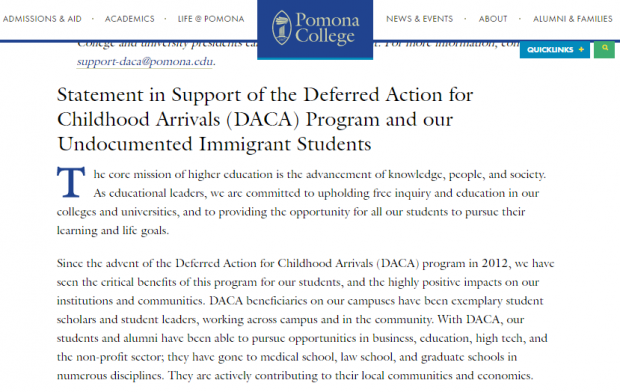
More than 583 colleges and universities have pledged to protect their undocumented students from deportation following the election of Donald Trump, who in his campaign vowed to end a 2012 presidential executive action that deferred deportation for undocumented students who came to the U.S. as children.
The Deferred Action for Childhood Arrivals policy is now the focus of various petitions, including one from Pomona College in California that had over 500 signatures as of Dec. 12. St. Thomas President Julie Sullivan signed both the Pomona letter and the Association of Catholic Colleges and Universities’ similar petition in support of DACA.
“Supporting the DACA policy and enrolling qualified DACA beneficiaries, who had limited or no control over the circumstances through which they settled in the United States, is consistent with the university’s Catholic identity, its mission and its convictions,” a statement released by St. Thomas read.
The university also wrote that it “has no plans” to change its admissions process.
St. Thomas Study Abroad also issued an advisory email on Dec. 16 warning DACA students to return to the U.S. before inauguration day on Jan. 20, 2017.
“It is not clear whether the DACA policy will be continued following the commencement of the new U.S. administration,” the email read. “There is a risk that DACA students who are outside the United States on or after January 20, 2017, could be prohibited from re-entering the United States.” St. Thomas “cannot guarantee re-entry into the United States, even for students participating in an approved St. Thomas study abroad program.”
More than 740,000 young people, often called “Dreamers,” are affected by DACA, according to the Department of Homeland Security. Trump had denounced Obama’s executive actions on immigration during the campaign, calling DACA “one of the most unconstitutional actions ever undertaken by a president” in June.
Chicago Mayor Rahm Emanuel, one of 15 mayors to sign a pro-DACA petition, met with Donald Trump on Dec. 8 to discuss the future of the program. Trump is quoted in Time Magazine’s Person of the Year interview taking a more moderate stance on the issue.
“We’re going to work something out that’s going to make people happy and proud,” Trump said. “They got brought here at a very young age, they’ve worked here, they’ve gone to school here. Some were good students. Some have wonderful jobs. And they’re in never-never land because they don’t know what’s going to happen.”
Karen Lange, St. Thomas vice president for student affairs, said it’s this uncertainty about these students’ futures that drove St. Thomas to sign the two petitions.
“I think there’s so many unknowns right now,” Lange said. “We just want to make sure that we’re continuing to support our students that are undocumented and create the best environment for them.”
Lange emphasized that St. Thomas wanted to send a clear message of support to its current undocumented students while pledging to continue to admit DACA students, regardless of any Trump administration action.
“My perspective is, it’s really about supporting our students, and I think the message is, we’re not changing our policies; we are not changing our admissions experiences,” Lange said. They “will continue to have the best experience they can have at St. Thomas, and graduate and receive degrees.”
St. John’s University, the College of St. Benedict, the College of St. Scholastica and St. Catherine University are the other Catholic Minnesota universities that signed the ACCU petition, which “expresses hope” that students who qualified for DACA “are able to continue their studies without interruption and that many more students in their situation will be welcome to contribute their talents to our campuses.”
St. Mary’s University of Minnesota in Winona appears to be the only Catholic college in the state that did not participate in the ACCU petition.
The DACA statements are part of a larger nationwide push for sanctuary campuses, a term that St. Thomas has not yet adopted because, according to Kymm Martinez, the university’s chief marketing officer, the buzzword currently has no legal bearing.
The term was borrowed from “sanctuary cities,” a designation that various major cities across the U.S. have adopted, including Minneapolis and St. Paul, meaning that law enforcement in these cities will not deport undocumented people for breaking federal immigration laws.
The University of Minnesota’s student government president, Abeer Syedah, led the charge to give her campus sanctuary status. More than 1,100 people signed her petition at the end of November before she sent it to university president Eric Kaler.
In an interview with TommieMedia, Syedah acknowledged that the term “sanctuary campus” holds no legal meaning but said it is still important her university designate itself as such.
“We use the phrase ‘sanctuary campus’ because it implies this overarching, umbrella idea,” Syedah said, adding that support of DACA is one “very, very critical” component of immigration policy.
“The other half was, ‘We do explicitly stand with you; we are here to protect you,’” Syedah said. “That matters because without that, the fear can kind of just linger.”
Syedah wanted to call on Kaler as a person of power to “tell people that there will be resistance” if deportation policies are enacted. Syedah said the sanctuary campus designation would also help “make sure that there aren’t detentions or deportations based on national origin,” a reference to Trump’s much-talked about proposal to ban immigrants of certain nationalities from entering the U.S.
The Pomona and ACCU petitions can be found here and here.
Sophie Carson can be reached at sophia.carson@stthomas.edu.

